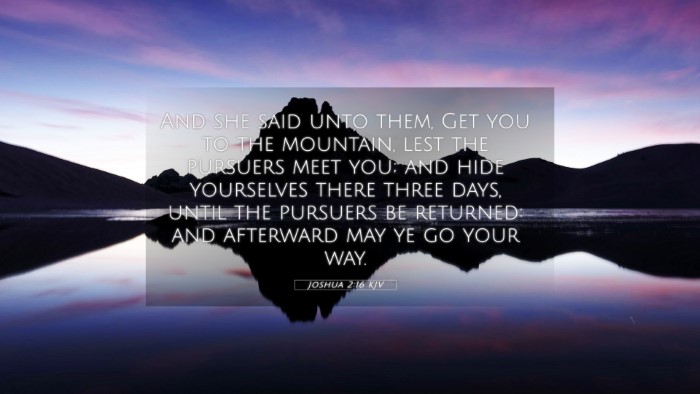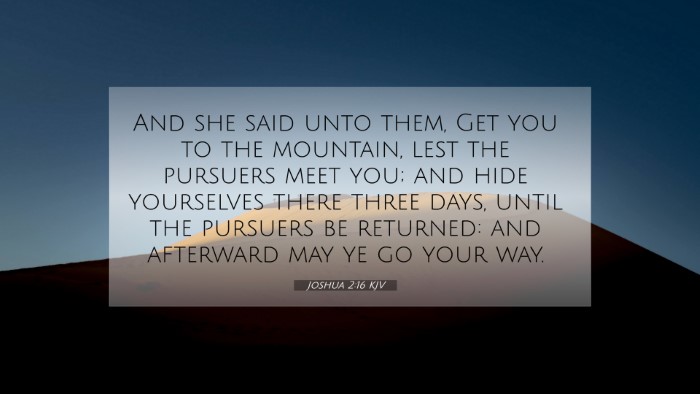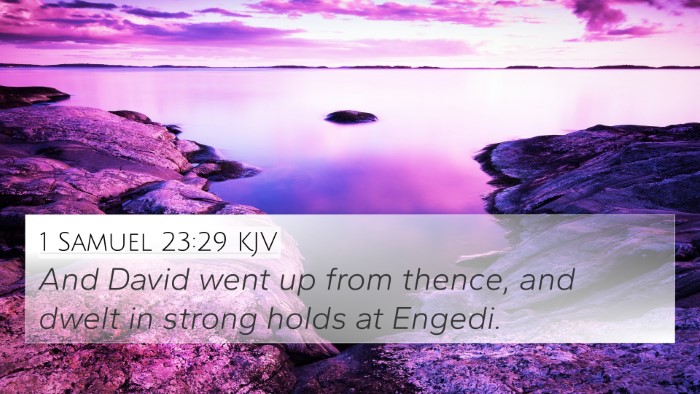Old Testament
Genesis Exodus Leviticus Numbers Deuteronomy Joshua Judges Ruth 1 Samuel 2 Samuel 1 Kings 2 Kings 1 Chronicles 2 Chronicles Ezra Nehemiah Esther Job Psalms Proverbs Ecclesiastes Song of Solomon Isaiah Jeremiah Lamentations Ezekiel Daniel Hosea Joel Amos Obadiah Jonah Micah Nahum Habakkuk Zephaniah Haggai Zechariah MalachiJoshua 2:16 Similar Verses
Joshua 2:16 Cross References
And she said unto them, Get you to the mountain, lest the pursuers meet you; and hide yourselves there three days, until the pursuers be returned: and afterward may ye go your way.
Uncover the Rich Themes and Topics of This Bible Verse
Listed below are the Bible themes associated with Joshua 2:16. We invite you to explore each theme to gain deeper insights into the Scriptures.
Joshua 2:16 Cross Reference Verses
This section features a detailed cross-reference designed to enrich your understanding of the Scriptures. Below, you will find carefully selected verses that echo the themes and teachings related to Joshua 2:16 KJV. Click on any image to explore detailed analyses of related Bible verses and uncover deeper theological insights.
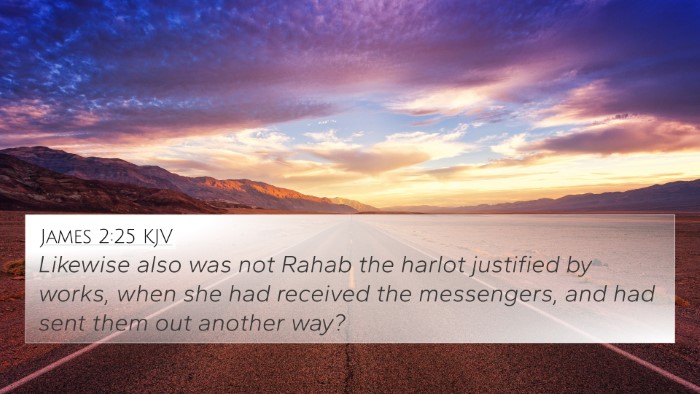
James 2:25 (KJV) »
Likewise also was not Rahab the harlot justified by works, when she had received the messengers, and had sent them out another way?
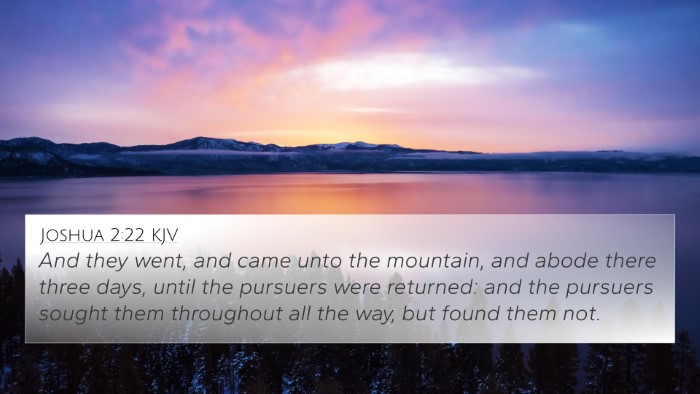
Joshua 2:22 (KJV) »
And they went, and came unto the mountain, and abode there three days, until the pursuers were returned: and the pursuers sought them throughout all the way, but found them not.
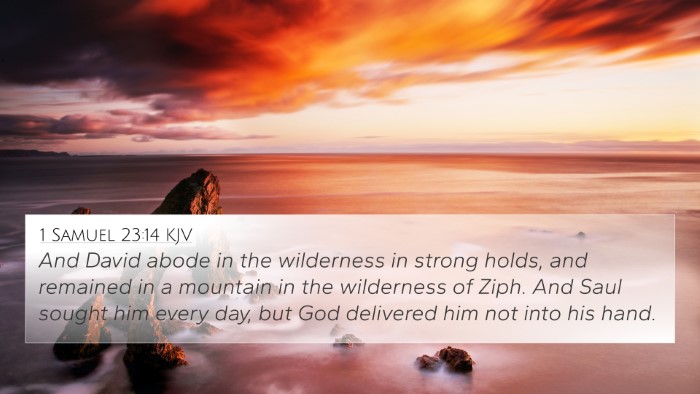
1 Samuel 23:14 (KJV) »
And David abode in the wilderness in strong holds, and remained in a mountain in the wilderness of Ziph. And Saul sought him every day, but God delivered him not into his hand.
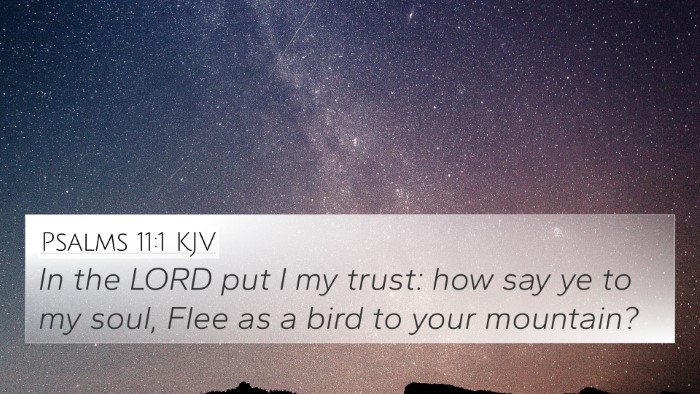
Psalms 11:1 (KJV) »
In the LORD put I my trust: how say ye to my soul, Flee as a bird to your mountain?
Joshua 2:16 Verse Analysis and Similar Verses
Meaning of Joshua 2:16
Joshua 2:16 states: "And she said unto them, Get you to the mountain, lest the pursuers meet you; and hide yourselves there three days, until the pursuers be returned: and afterward may ye go your way." This verse is part of the narrative where Rahab assists the Israelite spies sent by Joshua to scout Jericho. The significance of this verse can be interpreted through multiple biblical themes and connections.
Context and Overview
This verse occurs during a pivotal moment in the conquest of Canaan. Rahab, a resident of Jericho, provides refuge to the Israelite spies, showing a remarkable act of faith. Her guidance to hide in the mountains with a strategic duration of three days signifies not only her loyalty but also her cunning wisdom in ensuring the safety of the spies.
Insights from Public Domain Commentaries
- Matthew Henry: Henry emphasizes the faith of Rahab, noting her fearless action in aiding the spies despite the risk it posed to her life. He underscores how God can use anyone, even those outside His covenant people, in the fulfillment of His plan.
- Albert Barnes: Barnes highlights the geographical significance of Rahab's advice, suggesting that the mountains would provide them with a safe hiding place. He draws attention to the symbolism of "three days," which might parallel the time required to deliver from danger.
- Adam Clarke: Clarke discusses the character of Rahab as a wise and resourceful woman. He points out that her instructions were both practical and astute, allowing her to negotiate her own safety as well as that of her family during Israel’s impending conquest.
Key Themes and Connections
This verse can be analyzed under several thematic lenses that relate to broader biblical narratives:
- Faith and Courage: Rahab's courage in protecting the spies illustrates the broader theme of faith leading to actions of bravery, acknowledging God's impending judgment on Jericho.
- Divine Providence: The story exemplifies how God orchestrates events through unlikely individuals to accomplish His purposes, reminiscent of the story of Joseph in Genesis 50:20.
- Protection and Redemption: Rahab's act of hiding the spies also symbolizes themes of salvation, as seen in the New Testament with Mary hiding Jesus and providing him sanctuary in his early years.
Bible Verse Cross-References
Joshua 2:16 links to several other scriptures that highlight similar themes of faith, protection, and divine guidance:
- Hebrews 11:31: "By faith the harlot Rahab perished not with them that believed not, when she had received the spies with peace." This verse commends Rahab's faith as pivotal in her salvation.
- James 2:25: "Likewise also was not Rahab the harlot justified by works, when she had received the messengers, and had sent them out another way?" This verse also underscores Rahab's faith in action.
- Exodus 14:13-14: "And Moses said unto the people, Fear ye not, stand still, and see the salvation of the Lord, which he will show you today." The theme of divine protection resonates with Rahab's plea for safety.
- Proverbs 27:12: "A prudent man foreseeth the evil, and hideth himself: but the simple pass on, and are punished." This verse highlights Rahab’s wisdom in foreseeing the danger and acting accordingly.
- Matthew 10:16: "Behold, I send you forth as sheep in the midst of wolves: be ye therefore wise as serpents, and harmless as doves." Rahab exemplifies this wisdom in her dealings with the spies.
- 1 Peter 3:20: This verse alludes to the saving of Noah’s family, paralleling the narrative of Rahab’s family being spared due to her actions.
- Isaiah 19:24-25: "...in that day shall Israel be the third with Egypt and with Assyria, a blessing in the midst of the land..." showing God's inclusive plan for salvation even through the nations.
Similarities and Parallels
The connections between Joshua 2:16 and other biblical narratives can be insightful for deeper understanding:
- Both Rahab and Ruth (Ruth 1:16-17) exhibit extraordinary faith and loyalty, seeking refuge with God's people.
- Rahab’s protection of the spies also mimics the actions of David in 1 Samuel 19:11-12, where he was saved by Michal's protection.
- The strategic hiding and waiting motif is reminiscent of Elijah hiding from Jezebel in 1 Kings 19:3-4.
Conclusion
Joshua 2:16 serves as a profound testimony to the faith of Rahab and the broader themes of protection, divine intervention, and the unfolding of God's plan through faithful individuals. The commentary insights help further elaborate on its meaning, while cross-references illuminate the interconnectedness of biblical texts.

